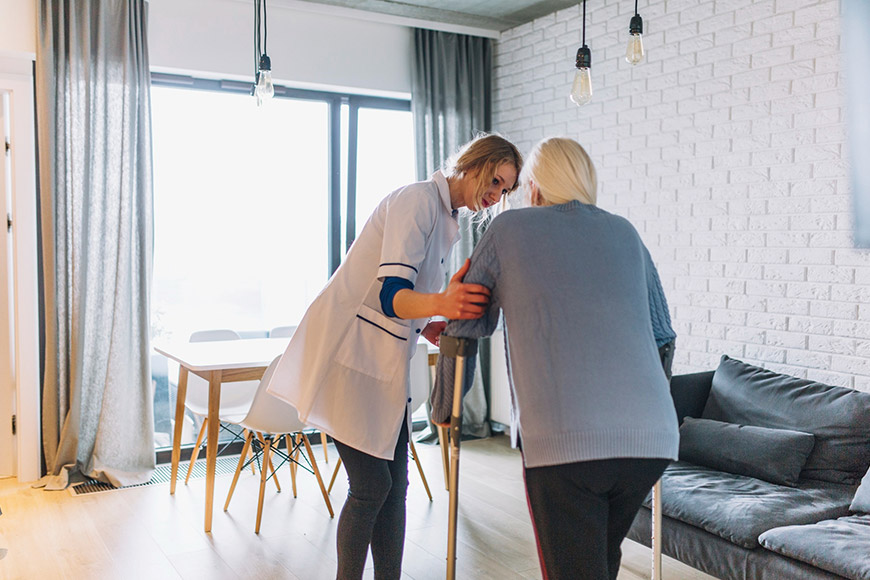
What does the care of immobile persons mean
What does care for immobile people mean, Belgrade, TOP PRICE✓ Care for immobile patients✓ Assistance in performing daily activities✓ Prevention of pressure ulcers✓
What does the care of immobile persons mean
Caring for immobile patients is not easy at all. Whether the person has limited mobility or is completely immobile, they require a special type of care and assistance. Since family members often cannot perform these tasks themselves, either due to obligations or lack of expertise, home care for patients provided by professionals is not only important but often essential.
Caring for immobile individuals requires time and dedication at all times, whether they are elderly or younger people. To ensure that the care for immobile patients is done correctly and to make daily life easier for both the patient and those caring for them, there are several things to consider. What caring for immobile individuals involves, you will find out in the following text.
When is care for immobile individuals the best solution?
Immobile individuals are people whose mobility is limited or completely impossible due to various illnesses, surgeries, or injuries. There are individuals who can move with the help of walkers or wheelchairs, so it is very important to get informed about what you need to know when choosing a wheelchair or other aids that can be of great help to an immobile person or a person with impaired mobility.
People who need orthopedic aids to move cannot use them independently, so despite the existence of electric wheelchairs, immobile individuals require assistance with transferring from the bed to the wheelchair in order to be able to use them on their own.
Also, home care for the elderly is necessary for those who have become weak due to age, whose mobility functions are diminished, or who are completely bedridden. People with these issues find it difficult to function completely, so they need help with trivial tasks such as eating, personal hygiene, taking medication, obtaining groceries and medicines, visiting doctors, and many other daily activities.
Personal hygiene of immobile patients at home and in bed
Caring for immobile patients at home requires a lot of attention and time. The first thing to consider is the care of the personal hygiene of the immobile person. If neglected, numerous skin conditions can arise, which can complicate the care of the patient and their overall quality of life.
Since immobile individuals are unable to bathe, wash, and use the toilet on their own, the patient should be washed every morning to refresh them and remove impurities and sweat, which often cause unpleasant odors. Additionally, regular washing and scrubbing of the skin stimulates better blood circulation.
The face, neck, teeth, hands, chest, armpits, and back up to the waist should be washed daily. Women should regularly rinse the genital area as it is sensitive and prone to infections. At a minimum, every immobile patient should be completely bathed at least once a day.
Patients who are constantly bedridden should be washed daily from head to toe, sometimes even multiple times a day, and a damp towel can be helpful in this process. Regular changing of bedding is also mandatory if the patient is confined to the bed.
Regular exercises as part of the care for immobile individuals
For patients who are bedridden, contractures, or stiffness of the joints, often occur, and this should be avoided. The position of the patient in bed should be in accordance with their capabilities, and care should be taken to avoid different types of skin damage, such as pressure sores which are common in bedridden patients.
Bedridden patients usually prefer the fetal position, with arms and legs bent, but caregivers must encourage them to move as much as possible to avoid becoming too sedentary. It is sufficient for them to stretch daily, squeeze stress balls, and perform similar exercises.
Every movement an immobile person makes is very important as it helps maintain muscle tone. For bedridden individuals due to immobility, anti-decubitus mattresses and cushions are excellent prevention against bedsores, so it is very important to make daily life easier for the patient as much as possible to prevent any additional ailments.
Caring for immobile patients and their nutrition
Caring for immobile individuals also involves preparing food and feeding the patient. It is very important for patients to have a varied and enhanced diet, rich in vitamins and minerals, to avoid various complications.
An enhanced diet that suits the patient's body helps them maintain strength and accelerates wound healing if they occur. The ideal is for immobile individuals to have five meals a day to keep their metabolism active despite their lack of movement.
Caring for immobile individuals requires a lot of attention and patience, and it is not uncommon for families to frequently seek professional help to ensure the patient receives all the necessary care. When it comes to caring for immobile patients, Belgrade is a city that offers the possibility of hiring professionals who will provide high-level care for individuals with impaired mobility.
Proper care for immobile individuals is essential to ensure a good quality of life. With the Eliksir team always available for any questions, doubts, and assistance, appropriate care for immobile patients is guaranteed.